Each December I like to reflect on the best things I’ve read over the course of the year and I’d like to share some of those with you. You’ll notice that none of these are explicitly tech-related as I don’t find myself reading many tech books cover-to-cover anymore.
You can read last year’s favorite books here.
The Education of an Idealist
by Samantha Power
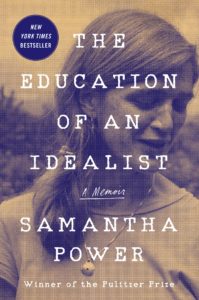
Samantha Power is a human rights advocate and the former US Ambassador to the United Nations. Her book is a memoir of her life as an Irish immigrant to the United States, career as a foreign reporter, and path to the White House. While I’d heard her name before, I wasn’t familiar with her work or story at all, but I’m glad I am now. The Education of an Idealist was the best book I read this year and dramatically changed the way I view certain facets of the world.
Power moved to the US at a young age with her mother. After attending Yale, she eventually went to work as a freelance war correspondent in Yugoslavia. Although I lived through this time, I was quite young and didn’t fully grasp the atrocities carried out by the Serbian nationalist movement. Power paints a fascinating picture of the horrors Bosnians went through at places like Sarajevo and Srebrenica. At the same time, she highlights what it meant to be a war reporter in conflict areas and how her experiences shaped her views on human rights.
But every day, almost all of us find ourselves weighing whether we can or should do something to help others. We decide, on issues large and small, whether we will be bystanders or upstanders.
Power, Samantha. The Education of an Idealist (p. 132). Dey Street Books. Kindle Edition.
Eventually, Power would complete her law degree at Harvard before working as a foreign policy advisor to Senator Barack Obama. Her career trajectory led her to Obama’s foreign policy staff before being assigned to the UN. While I understood the purpose and occasional dealings of the UN, I never quite grasped how the sausage was made. Power tells several stories about how diplomacy occurs as highlighted through the backdrop of several events most folks will remember: the Syrian chemical weapon attacks, Russia’s incursion into Crimea, and the rise of Boko Haram in Africa.
Power is perhaps one of the country’s foremost leading expert’s on genocide, and her memoir helped contextualize genocide through the story of various recent conflicts around the world. Seeing these conflicts through her eyes as a reporter and ambassador was lens shifting for me. Idealism isn’t about living up in the clouds pretending the world is perfect. Idealism is about picturing a better world and doing some part to help move people there. This sort of movement happens at every scale but often begins as simply hearing stories about the lived experiences of others and relaying those to a broader audience; as both a megaphone and a decision-maker. Power was in a unique spot because she served as both the megaphone and decision-maker in her career. Her depiction of these events came across as honest, meaningful, and compelling.
The Education of an Idealist challenges you to rethink your place in the world and question how you assess the impact of one human life versus another. It will force you to think about your role in broader human conflict and how small efforts can improve the experience of others.
The Moment of Lift
by Melinda Gates
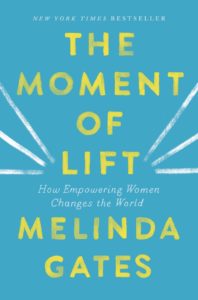
Melinda Gates runs the Bill and Melinda Gates Foundation and has for the past several years, dedicated much of her life to a variety of causes including public education, world health, and global development. After hearing her tell some stories from her work in an interview with David Letterman, I knew I had to read her book.
The Moment of Lift is a book about how lifting up women lifts up everyone. Gates tells her story through a series of topical chapters focused on topics like family planning, maternal and newborn health, women’s education, unpaid work, child marriage, women in agriculture, and women in the workplace. Her perspective is primarily global, highlighting individual cases in countries spanning from rural Africa to urban India. I found many of these stories motivating, while others were simply heartbreaking. In most instances, she ties the stories to global trends and highlights examples of how improving various forms of women’s oppression improves the quality of life for everyone.
Perhaps the most individually moving part of the book to me personally was Gates’s description of how others rationalize the exclusion of those that are different.
Overcoming the need to create outsiders is our greatest challenge as human beings. It is the key to ending deep inequality. We stigmatize and send to the margins people who trigger in us the feelings we want to avoid. This is why there are so many old and weak and sick and poor people on the margins of society. We tend to push out the people who have qualities we’re most afraid we will find in ourselves—and sometimes we falsely ascribe qualities we disown to certain groups, then push those groups out as a way of denying those traits in ourselves. This is what drives dominant groups to push different racial and religious groups to the margins. And we’re often not honest about what’s happening. If we’re on the inside and see someone on the outside, we often say to ourselves, “I’m not in that situation because I’m different.” But that’s just pride talking. We could easily be that person. We have all things inside us. We just don’t like to confess what we have in common with outsiders because it’s too humbling. It suggests that maybe success and failure aren’t entirely fair. And if you know you got the better deal, then you have to be humble, and it hurts to give up your sense of superiority and say, “I’m no better than others.” So instead we invent excuses for our need to exclude. We say it’s about merit or tradition when it’s really just protecting our privilege and our pride.
Gates, Melinda. The Moment of Lift (p. 52). Flatiron Books. Kindle Edition.
I could share dozens of quotes I’ve highlighted from The Moment of Lift, but you should really just read it. I find myself referencing this book often and I’ve even started giving away copies to friends and acquaintances.
How Change Happens
by Cass Sunstein
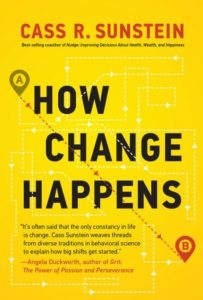
I’ve always believed that hope unites all humans. That desire for a better future comes about through change, but how does that change flourish in a world where so much works against it? Cass Sunstein, one of my favorite authors, set out to describe the psychology of change in this book.
A lawyer and behavioral economist, Sunstein dives into the human factors that precipitate and sustain change. His perspective drills down into recent psychological literature exploring things like the dynamic of group polarization and how expressive functions impact individual thinking shifts. Sunstein then pulls in prior work on nudges to discuss how these subtle shoves towards a way of thinking deliberately and inadvertently lead to change.
As he typically does, Sunstein frames his concepts through modern themes and examples, framing them through immigration, healthcare, and other hot button topics. He touches on concepts like ethics, control, and coercion while highlighting why people fall into allegiance with individual parts or moral standpoints.
How Change Happens helped me better frame why individuals believe the things they do and helped me better understand how I might induce positive change through my own work.
Where the Crawdads Sings
by Delia Owens
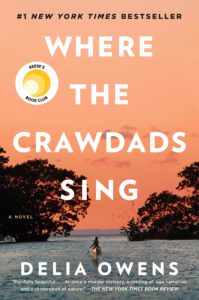
I only read a few fiction books each year, but I’m really glad I picked up this one. Where the Crawdads Sing is the story of Kya, a girl who lives in an isolated portion of North Carolina swamp. Her Mom and siblings leave due to her abusive alcoholic father, who eventually disappears himself leaving Kya on her own to figure out how to survive. The story follows Kya’s journey as she learns to fend for herself and eventually interact with the outside world.
Owens tells a beautiful story that quickly weds your interest to the individual characters, particularly Kya. At first, you read with amusement as everything the isolated girl from the swamp does seems peculiar. As she begins to understand the broader world so do you start to understand her and the place she calls home. Eventually, you begin to see the events of the book through her eyes without knowing the transition has even occurred.
Where the Crawdads Sing paints a beautiful picture of a magical place with riveting characters. I listened to the audiobook, which had fantastic voice acting. This was my favorite fiction book read in 2019.
Pedagogy of the Oppressed
by Paulo Freire
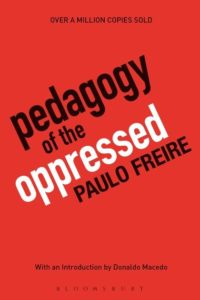
Freire’s Pedagogy of the Oppressed is something of a bible for educators, serving as a north star for the true believers who seek to change the world through the transmission of knowledge. While I’ve encountered countless quotes from the book, I finally sat down to read it in its entirety this year (in part because it was assigned by my doctoral program).
While it starts slow with general discussions of oppressors and the oppressed, Freire’s discussions of power dynamics quickly begin to read more like a call to action than a history book. The goal, for Freire, is both freedom and praxis, or the informed action occurring where theory and practice meet. Eventually, Freire describes his view of the banking model of education where instructors simply deposit information into students. He discusses how this approach dehumanizes students urges for a more authentic education in which students are active participants in the creation of their own knowledge.
There is no such thing as a neutral educational process. Education either functions as an instrument that is used to facilitate the integration of the younger generation into the logic of the present system and bring about conformity to it, or it becomes “the practice of freedom,” the means by which men and women deal critically and creatively with reality and discover how to participate in the transformation of their world.
Freire, Paulo. Pedagogy of the Oppressed: 30th Anniversary Edition . Bloomsbury Publishing. Kindle Edition.
Although Pedagogy of the Oppressed was written 50 years ago, you’ll hear echoes of modern social and educational theory like cultural wealth, hegemony through education, the impartiality of knowledge, and culturally relevant pedagogy. It’s impossible to be an educator and not be inspired by Freire’s call to action. We often tend to separate issues of education from issues of society, but Freire demonstrates clearly how the two will forever be linked.
The Reckoning
by John Grisham
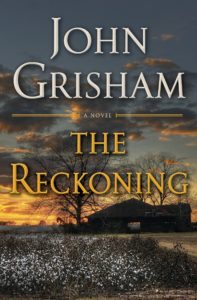
While I’m not the Grisham fan that others are (I’ve only read half a dozen or so of his titles), I picked up The Reckoning to listen to on audiobook while I worked out in my woodshop. The book takes place in rural Mississippi just after WW2. Pete Banning, a war hero who’s just returned home, walks into a local church and shoots the pastor dead. The book then follows two threads: Pete’s present trial and his life story with a specific focus on his wartime experiences.
Most who read Grisham expect an engaging legal thriller and The Reckoning delivers, as always. However, I did not expect the book to double as a war novel, and particularly one that detailed the events of Pete’s life so well. Grisham’s story is a journey through the past to describe events of the present. As you read, you try to piece together every piece of information about Pete’s life to figure out why he shot that pastor. I was hooked from the first chapter and remained engaged until the last word. I also appreciated Grisham’s vivid depictions of much of the south, include many areas where I’ve spent significant time.
A Problem From Hell: America and the Age of Genocide
by Samantha Power
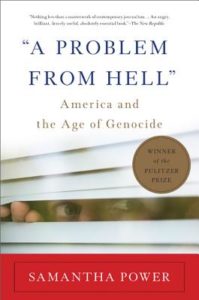
After reading The Education of an Idealist, my curiosity to led me to Samantha Power’s seminal book on modern genocide. This was the book that more or less launched Power’s prominent career and established her expertise on the subject. In A Problem from Hell, Power focuses on genocide occurring from the early 1900s onward. This includes mass human extermination in Armenia, the Holocaust, the Cambodian genocide conducted by the Khmer Rouge, the Rwandan genocide against the Tutsi, massacres during the Yugoslavian wars, and more.
This isn’t simply a history book, however. Its focus is specifically on the role of the United States within these conflicts. Power also traces the origin of the word genocide and the struggle to get international courts and world superpowers to acknowledge the unique nature of the crime. Much of this follows the work of Raphael Lemkin, a Polish-Jewish legal scholar who lost 49 relatives during the Holocaust.
I will warn you, that this book will make you uncomfortable for a variety of reasons. It describes horrific events in chilling detail, perhaps the most unnerving of which is that many of these atrocities were allowed to transpire for so long before enough collective people stood up to say “enough”. A Problem from Hell left me with a broader understanding of the political responsibility collective nations have to hold others accountable for valuing human lives. It also provides a framework for recognizing social, political, and economic indicators of potential future genocide. I had high expectations for this book after reading Power’s memoir, and I wasn’t let down.
Midnight in the Garden of Good and Evil
by John Berendt

It’s a bit embarrassing that I’ve lived in the south so long and haven’t read what is, perhaps, one of the most quintessential southern books. I finally picked up Midnight in the Garden of Good and Evil and had trouble putting it down once I did.
Berendt’s story, loosely based on real events, is all about painting a picture of Savannah and the wildly diverse and over the top characters that comprise an inner societal circle. Much of the early portion of the book speaks to each of these characters, detailing their various exploits. Each character’s story reads almost like a story in itself, and you’re left wanting to learn more about each of them. Eventually, the character’s stories come together in a confluence of events which shifts the book towards that of a legal thriller, with a few echoes of southern charm, voodoo, and a few other surprises.
The next time I’m in Savannah I’ll look at the place quite a bit differently.
Next Year
I’ve already got a reading list a mile long which persists many of the same themes: psychology, human behavior, social change, rural issues, and social injustice. I also hope to read more about applied economics, particularly as it relates to agriculture and food. As often happens, it seems that many of the best books I read are ones I never planned to and they just pop up on my radar. That’s the best kind of surprise though.
Did you have a favorite book you read this year or recommendation you think I’d like? If so, I’d love to hear about it in the comments.